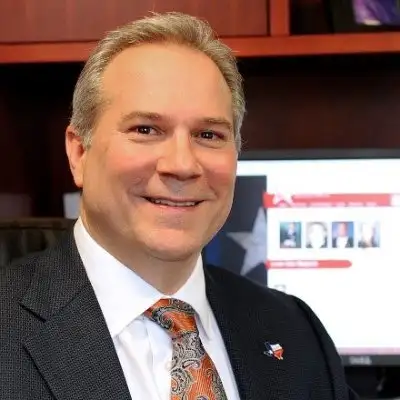Texas GOP goes all-in for Authoritarianism
Heidi Heitkamp [00:00:04]:
Welcome to the Hot Dish, comfort food for rural America. I'm Heidi Heitkamp.
Joel Heitkamp [00:00:08]:
And I'm Joel Heitkamp. Today we're going to talk about gerrymandering and redistricting in Texas. It's a hot button topic right now.
Heidi Heitkamp [00:00:17]:
Well, it sure is. And if you're nervous about what's happening, just change the rules. Just change the rules, Joel. You don't have to go out and work hard to earn support. You just change the rules and then you win. That's how it seems to go there. Well, we're going to have an expert, unlike you and I. His name is Matt Angle and he's from the Lone Star Project and he's going to be joining me for a must listen conversation if you're concerned about what's happening in Texas right now.
Joel Heitkamp [00:00:47]:
We're going to learn a lot about this Texas issue today and I'm excited to get started. You know what, Hyde? Take it away.
Heidi Heitkamp [00:00:58]:
Thanks, Joel. I'm here with Matt Angle, who is the founder and director of the Lone Star Project, a political research and strategic communication organization in Texas. The Lone Star Project works to help individuals, organizations and the press see beyond the misinformation that is typically provided by the current Republican state legislature in Texas and doing really important work nationally right now. Matt, welcome to the Hot Dish.
Matt Angle [00:01:26]:
Happy to be here, Senator. Thank you for having me.
Heidi Heitkamp [00:01:28]:
Well, I'm thrilled to have you because this topic is so, let's say, topical. I've been on many national shows this weekend, and every one we've been talking about what's happening in Texas and the inevitable what should the Democrats do about it, not just in Texas but nationally. So we'll get to that at the end. But okay, let's start out with the opening question. What's happening in Texas?
Matt Angle [00:01:51]:
Well, what you're seeing in Texas is an assault on democracy that does go beyond our borders. But in Texas, what you've got is the governor and the legislature just cowardly collapsing to the demands of Donald Trump to create at least five new districts that Republicans will have in order to bolster Republicans because of the failed policies of Trump. He knows that he will lose the control of the house in 2026 unless he rigs the system and he's starting in Texas trying to deliver five seats. It will go beyond the Texas border if we don't stop it here or really have a national response from Democrats. The other thing important to remember in Texas is that partisan gerrymandering is racial gerrymandering in Texas. There is only 13 out of 38 districts in which minorities can elect their candidate of choice, even though Blacks and Hispanics and Asians together make up over 60% of the Texas population. And so if you reduce that from 13 down to only 8, then you. It is gross distortion of not just the politics of Texas, but the racial makeup of Texas.
Heidi Heitkamp [00:03:05]:
That's an interesting statistic that I've never heard, but it does put stuff in a very sharp contrast. So now that, as I understand it, and correct me if I'm wrong, the Texas Legislature is meeting to basically accomplish and do Trump's bidding, led by your governor, who seems to want to respond favorably to Trump at every turn of the way. And so where's the Texas Legislature in this process? And is it likely you'll be able to stop it in the legislature? Is this a foregone conclusion?
Matt Angle [00:03:38]:
Well, this is where we are today. This morning, actually, as we're speaking, there's a hearing before the House Committee on redistricting on the map that they have proposed, which would decimate minority voting strength in Texas in order to create five new Republican districts. That hearing will go on for 10 hours. It's the only hearing they've had on the map. They cynically held seven hearings between the House and the Senate publicly before there was any map. Texans overwhelmingly, 99% to 1, opposed them doing anything.
Matt Angle [00:04:11]:
But they're relentlessly moving forward. If there is no disruption, if the Democrats don't decide to break quorum, then the map will likely be voted out of the House next week and then would move to the Senate. Now, Democrats have some filibuster options in order to delay things in order to build the strong legal record against the map because it is a overt violation of the Voting Rights Act, as the Voting Rights Act has been interpreted at least. And also they have the option to break quorum if they choose to do that in order to further delay, in order to not just build the record, but I think also provide some room for the rest of the country and some of the other states to realize that Texas is just the front in a national war and that it's important that other Democratic states start to fight fire with fire.
Heidi Heitkamp [00:04:59]:
The question that I ask is, is there a chance that they're being too cute by half and that this could actually electorally backfire on them?
Matt Angle [00:05:09]:
Well, that's a little bit of wishful thinking by a lot of Democrats and pundits. I mean, they protected pretty well all the districts they currently hold. Now, of the five that they converted to districts in which minorities elected their candidate of choice, which are usually Democrats, into districts controlled by Anglos that will probably elect Republicans. There's two of those that we have, strong Democratic incumbents, and they have a good chance of holding on to those. And so rather than getting five, it could end up being just three. But three is a lot. And again, even if Democrats are able to hold those districts, the damage that they will have done to minority voting rights across the state will remain.
Heidi Heitkamp [00:05:54]:
I think it's really important that we should always, always stay focused on the fact that this isn't about Democrats or Republicans. It's about people's right to vote and right for representation. And I think you very aptly, I think, said, you know, this isn't about Democrats or Republicans. This is about taking away and disenfranchising what is, in fact, a minority majority in the state of Texas to hang on to political power.
Matt Angle [00:06:20]:
Yeah, and it's, it's disorienting, I think, to the national media a lot of times to think about things in terms of other than Democrats versus Republicans or partisan. But it's simple to say it, but it's a difficult concept for people to get their head around that in Texas, the method, the process that Republicans have used in order to gain partisan advantage is to systematically undermine the voting strength of minority citizens. And it distorts politics in Texas at every level.
Heidi Heitkamp [00:06:51]:
This is not the first time that this has happened in Texas, right?
Matt Angle [00:06:56]:
Correct. The template for this was set back way back in 2003, when then the notoriously partisan Tom DeLay, who was a corrupt Republican leader in Congress, he bullied the legislature at that time into redrawing districts in mid decade and also really kind of pioneered the use of racial gerrymandering to achieve partisan gains and set the template for the rest of the South. Then the south saw what DeLay had done in Texas to eliminate at that time six Democratic seats where minorities had voting strength. And that method was used in 2011 across the South and in some of the Midwest, and then repeated in 2021. And so if you're really looking at where the page turned and where Republicans really started using hostility to minority voters as a political tool to gain voting strength, it was way back when Tom DeLay reviewed the district's mid decade in Texas in 2003.
Heidi Heitkamp [00:07:56]:
Yeah. So one of the questions I'm sure our listeners have is, you know, what is the likelihood that this will be stayed or at least kind of judged harshly by the courts?
Matt Angle [00:08:06]:
Well, it's important to keep in mind, had the courts not overturned the preclearance provisions of the Voting Rights act, then this map wouldn't see the light of day. It would never be able to go forward. But given that now there is no preclearance, then we have to move to a Federal Court to get it enjoined. There is a good chance or less than 50/50 on anything. But there is a certainly a more than zero chance of getting into federal court because there is already a three judge federal court formed because who just heard complaints against the current map, which also doesn't fairly represent minorities. And they heard three weeks of testimony as how the current map is inadequate. And so if we get back before that court showing that even that map now has been further diminished, it's gone from 13 districts where minorities have the opportunity to elect their candidate of choice to only 8. We believe that that court may step in and say enough's enough.
Heidi Heitkamp [00:09:01]:
Yeah, it's going to be interesting because right now you're seeing the governor of California, perhaps Illinois, perhaps Michigan, saying New York, although New York is a different situation, saying, look, two can play this game. And I think there's a lot of people who have done this for a lot of years like you, who just hate to see this contagion jump red/blue line and basically lead to kind of similar tactics in blue states. But I will tell you that the Democrats that I talk to, especially the activists, are saying, look, we can't, you know, bring a knife to a gunfight. We've got to be as aggressive as they are. I mean, how do you react to what's happening in the dialogue across the country?
Matt Angle [00:09:45]:
Well, it's maddening and it's frustrating because none of us want a process in which state after state, there's a distortion of the district lines to help one party or the other. However, we'll never fix that if we don't achieve power in order to reform. And so I think it's very important that Democratic states respond just as aggressively so that Democrats can get regain control of the House, gain some leverage to, to bring reform. The truth of the matter is the high road's not available to us anymore. You take the high road under Donald Trump and it's authoritarianism, you'll walk right off a cliff. You gotta fight on their terms, on their terms, just as hard. And keeping in mind that, look, the good guys and the bad guys in this fight are easy to identify. We're the good guys.
Matt Angle [00:10:36]:
We're looking to gain power in order to make reform. They are looking to gain power to cement in and consolidate authoritarianism.
Heidi Heitkamp [00:10:46]:
Yeah. I have a kind of soft spot in my heart for people who have been fighting this on behalf of voter rights. And now we see so much race to the bottom in some way. And I think your statement about the high roads not available to us, I think that reflects 90% of what Democrats believe. Now, this idea, they go low, we go high. That's not where people are anymore in the Democratic political party.
Matt Angle [00:11:14]:
Yeah. If there's to be a high road, we're going to have to gain power and build it.
Heidi Heitkamp [00:11:18]:
Yeah.
Matt Angle [00:11:18]:
Because the Republicans have torn it to pieces.
Heidi Heitkamp [00:11:21]:
Yeah. Well, is there any Republicans who are nervous about this in Texas?
Matt Angle [00:11:27]:
One of the most startling things about this, I mean, I'm proud Texan and Texas politicians over the years have been fiercely independent, whether they're Democrat or Republican, and, and been jealously protective of their constituents. That's not the breed of Texas Republican anymore. They are totally submissive to Donald Trump. There's no Texas Republican Party now. It's a Trump Party in Texas. Governor Abbott and the Republican leadership in Texas, they took a knee before they saw a map. They didn't even draw the map. It was delivered to them from a Washington operative.
Matt Angle [00:12:04]:
And so it's startling and disappointing as a Texan to see any leader, I don't care what party there is, so willfully submit to a stronger voice. I mean, for goodness sake, way back in the day, you know, Congressman, you know, Jim Wright and Jake Pickle and, and Jack Brooks, they fought with LBJ. Texas Republicans fought with Ronald Reagan. These guys can't make a fist no matter how hard they clinch.
Heidi Heitkamp [00:12:30]:
So one final question, Matt. How do you think this will affect a rural voter? Not just a minority voter, but a rural voter?
Matt Angle [00:12:37]:
Again, one of the more frustrating things is how much damage that the Trump agenda and redistricting has done to rural Texas. I mean, rural Texas has real needs as it relates to especially health care and to schools. I mean, we're having rural hospitals close across the rural parts of Texas. And then of course, rural school districts really are the heartbeat of, a lot of times, of communities. And you've seen the most extreme anti-public school forces take control in Texas. And again, these cuts to Medicaid aren't just going to affect people in the cities. They're going to drastically impact and harm rural communities. And hospitals, a lot of times, hospitals in rural Texas are the biggest employers.
Matt Angle [00:13:23]:
They're closing down.
Heidi Heitkamp [00:13:25]:
But listen, Matt, this is gonna go on. We're in middle of it right now. Can you promise me, you'll come back and talk to the folks who listen to the Hot Dish about what's happening and, you know, keep us posted on your work and the people who care about voting rights in Texas, their work to preserve voting rights for all Texans, not just those who vote Republican.
Matt Angle [00:13:48]:
Yes, ma', am, I certainly will. And I'm so grateful that you're shining a light on this and letting the rest of the country know about the big fight that's happening in Texas.
Heidi Heitkamp [00:13:57]:
The big fight in Texas, as you have so eloquently said, is not going to stay in Texas. What happens in Texas is going to creep out across the country. And the hope is that it can be stopped in Texas so that we can get back to a more legal process for redistricting.
Matt Angle [00:14:15]:
100% agree. And again, thank you.
Heidi Heitkamp [00:14:17]:
Okay, thanks so much, Matt, for joining us on the Hot dish. You know, Joel, the one thing that I think is problematic in Texas is they're seeing in real time what these indiscriminate snatching up of people in the state of Texas and what it means to the economy. I think there's still some broad based support for deporting people who are bad actors in this country, people who entered illegally. But I think there's a whole lot of people who aren't really happy about what's happening. And it's not just in states like Texas. It's all over the region. And, you know, you have a really interesting story about a young woman that you and I both know who is Norwegian, who somehow got into this whole problem of people just kind of walking up and saying, get in the car.
Joel Heitkamp [00:15:12]:
Can you imagine what you would feel if somebody did that to somebody really close to you? In this particular case that we're talking about, this individual tans and they get incredibly dark. I know I've known this individual all of her life. And so you can be Norwegian and tan. But the fact of the matter is, they were targeting her because of her color. They were. And this has got to stop. And it's going to take Republicans in Congress to make it stop because Stephen Miller is putting a criteria out there of how many people that you have to have per day, per week. It's like they're deer hunting, for Christ's sake.
Joel Heitkamp [00:15:58]:
I mean, it's, it's repulsive, Heidi. It just is.
Heidi Heitkamp [00:16:01]:
And it is. I want everybody to think about if you were a woman and this happened to you. Not that, you know, I'm playing that card, but I think it doubles down in the scary factor.
Joel Heitkamp [00:16:12]:
Well, it does. I mean, it absolutely does. And it seems as though part of the strategy here was to get this individual alone, you know, to make sure that this individual was alone. And so, you know, luckily, there were others that, that jumped to her defense. But, you know, I don't want to go into too many details because basically she's asked me not to out of fear for her child. I mean, that's how scary it is for these folks, and they're going to have to live with that the rest of their life. And so I just have to say this. If you're so tough, if you're so tough that you can go up to a woman and scare the hell out of her that way and affect her life for the rest of her life, then why the hell can't you wear something that identifies who you are? Why do you have to wear a mask? Why do you have to sit there and hide that supposed badge you have? How are they supposed to know? I mean, how are they supposed to know whether or not somebody's accosting them to rape them, to steal them for - I mean, this is repulsive.
Joel Heitkamp [00:17:15]:
It's disgusting. But I'll tell you what, they're affecting real people's lives, Heidi, and it's got us ticked off.
Heidi Heitkamp [00:17:22]:
And there is going to be trauma that these people will experience every time someone approaches them, every time someone comes up to them. And just to add a little bit of detail so people understand there was just an approach; she said, I'm an American citizen. Who are you? No attempt to identify themselves. And then insisting that she get in a car. And right now, Joel, think about this. If you were a perpetrator, if you were a rapist, wouldn't you put on a mask and pretend you were whoever and say, get in the car?
Joel Heitkamp [00:17:56]:
Well, and that's how scary it can be. Complete utter strangers walking up. When you hear some of this stuff firsthand, it just makes you shake your head. And just because someone is tan, I mean, literally because they're tan, they want their federal ID, as it was called. And it just, it's repulsive. It's disgusting. It shouldn't take the threat of attorneys, no identification.
Joel Heitkamp [00:18:19]:
It's not the America that I grew up in. It's the America clearly we're in today or being allowed to be today. But, you know, imagine how scared she was. I mean, you and I raised daughters, you know, we know, imagine how scared they would have been.
Heidi Heitkamp [00:18:34]:
And it's not the America that we grew up in. It's not the America that we want to live in. And you know, no one wants people here who have committed heinous crimes. But this idea, you know, the promise was, and I think people believed him, that we were only going to deport the worst of the worst. Guess what? You know, when you look at the numbers, that's not going to get them to the numbers they need. And so today another story in social media about a guy who is a researcher researching basically a cure for Lyme disease. He's Asian and lives in the country on a green card, comes back into the country and he was basically disappeared for a week coming into the country and his family, they don't know where he is. And at a minimum, they should be required to give people at least one phone call and connect with one person to tell people where they are.
Heidi Heitkamp [00:19:28]:
And they're not even doing that.
Joel Heitkamp [00:19:30]:
Yeah, "at a minimum," I mean, give me a break! At a minimum, they should be able to be held to the same accountability that the Constitution holds all of us.
Heidi Heitkamp [00:19:39]:
And in the good news category, when you look at that polling, the vast majority of Americans think you shouldn't be able to do this without an independent third party looking at it. You know, there's no level of accountability which gets to this redistricting issue in Texas, which is, you know, they can sense that the grip, the, that, you know, that this so called mandate is slipping away, that this isn't going to be a favorable midterm. And so now they've got to rig the rules. And so all of the people out there are saying, when is going, when are we going to see a level of accountability or at least pushback? Well, number one, the first thing that I would say is quit expecting it from the President. He's a lame duck. You may think that he can be reasoned with. I don't think that's true. We have got to hold members of Congress accountable.
Heidi Heitkamp [00:20:30]:
We have got to have some level of accountability. And so this redistricting gets really, really significant and the midterms get significant. But again, this is a guy who doesn't really care about legitimate constitutional process.
Joel Heitkamp [00:20:45]:
If I were, and understand what we're really talking about here is the electoral College, I get that. But if I was the Governor of California, of Illinois, of Pennsylvania, of Kentucky, if I were any one of those, I would look at my staff right now and I'd say, draw me a plan, draw me a plan. Call it plan A, call plan B. But it's going to have my state gerrymandered. It's going to have my state exactly what they don't want to see. And then I would get on a plane, I'd go to the White House, I'd go to all those little smart butts that they have, and I'd say, look, go ahead and do it in Texas. Here's what we're going to do in California. Here's what we're going to do in Illinois.
Joel Heitkamp [00:21:24]:
Here's what we're going to do in states that are Blue states, where we control them. Now, let's see how you do. Because a lot of those states have a lot of congressmen in them. And so you know what's going to happen then. Heidi is the Michelle Fischbach in District 7 of Minnesota, which had voted Democrats at times with Colin Peterson. You start redistricting her a little bit, putting in this or that, draw a straight line towards the Twin Cities, and she's going to start crying, she's going to start whining, and she's gonna go to the White House and say, you just cost me my seat. Don't do this. You need me.
Joel Heitkamp [00:22:00]:
And so two can play that damn game.
Heidi Heitkamp [00:22:03]:
Well, I think that's what basically those governors are saying, that they are not gonna let this stand. That if what? Sauce for the goose is sauce for the gander. And it's a race to the bottom, Joel. This is all a race to the bottom because we shouldn't have partisan gerrymandering. We should have legitimate - I'm for just, just crank up the old AI and let the AI, you know, plug in a couple parameters and let AI redistrict, because that is going to make more sense than what's happening right now.
Joel Heitkamp [00:22:32]:
Well, and I can tell you this on a small, small, small scale. I got gerrymandered when I was in the legislature.
Heidi Heitkamp [00:22:39]:
Yeah, you did. It's a fun story.
Joel Heitkamp [00:22:42]:
Yeah, I did. I ended up having to run against a fellow Democratic senator. And, you know, it didn't exactly make for hugs and kisses all the time, but these guys gerrymandered me into my district. They didn't realize where I lived, and so they kept me in the district that I wanted to be in. It was like, can't you read a map? Or at least, can't you do the homework if you're going to be that big of jerks and find out where I live? And you know what? I still won. So there.
Heidi Heitkamp [00:23:11]:
That's the other point, Joel. When they're in charge of the rules, you need to figure out how you can still convince people that the time has come to be hold people accountable.
Joel Heitkamp [00:23:22]:
Well, my brand of politics and public policy has always been the same. You know, whatever you shall do to me, it's coming back tenfold. I don't know if that's in the Bible, I doubt it is. But, I mean, here's, here's my case. If Governor Abbott, who is one of the most evil men I think there is on this planet, if that man does what he does, then by God, Ken Martin and others better have a plan B because that's what they're hired to do.
Heidi Heitkamp [00:23:49]:
Yeah, I have no doubt about it. Well, anyway, this is a really important issue, one we're going to be covering, and it's really important to our mission here at One Country. And it's something we need to not talk about just this time, but stay on top of as we head into the Midterms. Well, listen, I think that's a wrap for us in this episode. Joel, if you're around, let's keep talking about these issues that are important to rural America. Keep talking about what's happening with the rural economy, how various policies are going to affect the rural economy. We'll be on it on a regular basis.
Joel Heitkamp [00:24:29]:
You know, and you can email us your thoughts. Our email address is podcast@onecountryproject.org. And to keep up with everything One Country is doing between these podcast episodes, be sure to follow us on Bluesky and Substack.
Heidi Heitkamp [00:24:44]:
Thank you for joining us today on the Hot Dish, which is brought to you by One Country Project, making sure the voices of the rest of us are heard in Washington. Learn more at onecountryproject.org. And we're going to be back in two weeks with more Hot Dish, comfort food for rural America.
Creators and Guests







